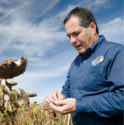Advertise Follow Us
Articles Tagged with ''biotechnoogy''
What I've Learned from No-Tilling
5 Factors Help No-Tiller Come Out Ahead
Watching weather conditions at critical growing points, and annual soil testing, has helped Doug Goehring succeed at no-till.
Read More
Is There Hope For Biotech Wheat?
Advocates believe lower production costs and higher yields could come from biotech and would reverse the trend of declining wheat acres.
Read More
Monsanto Puts Hold On Roundup Ready Wheat
Instead of being introduced as early as 2005, it may be 2012 before Roundup Ready spring wheat is released.
Read More






